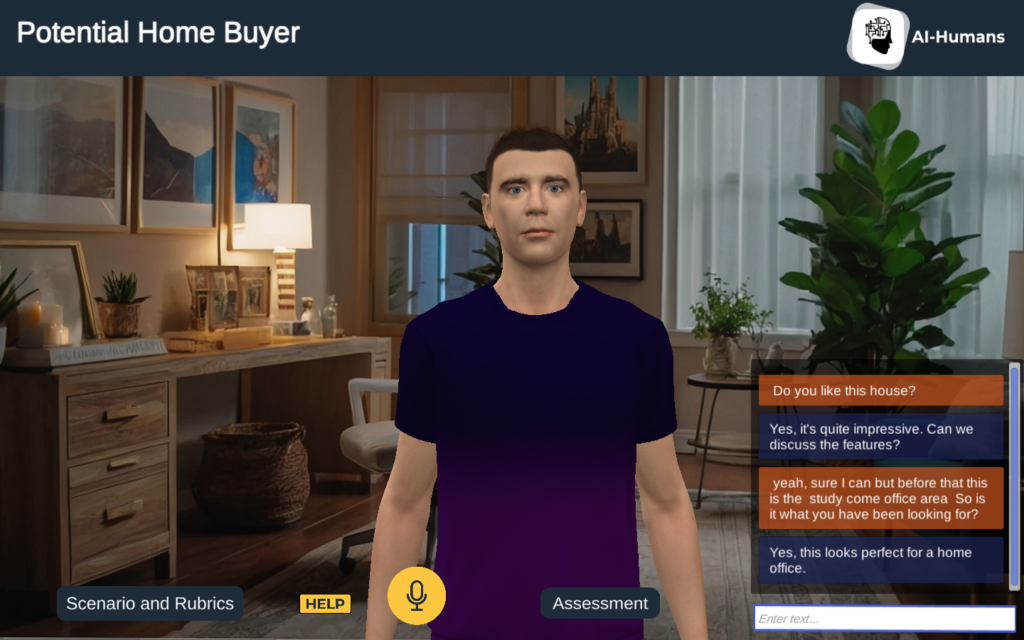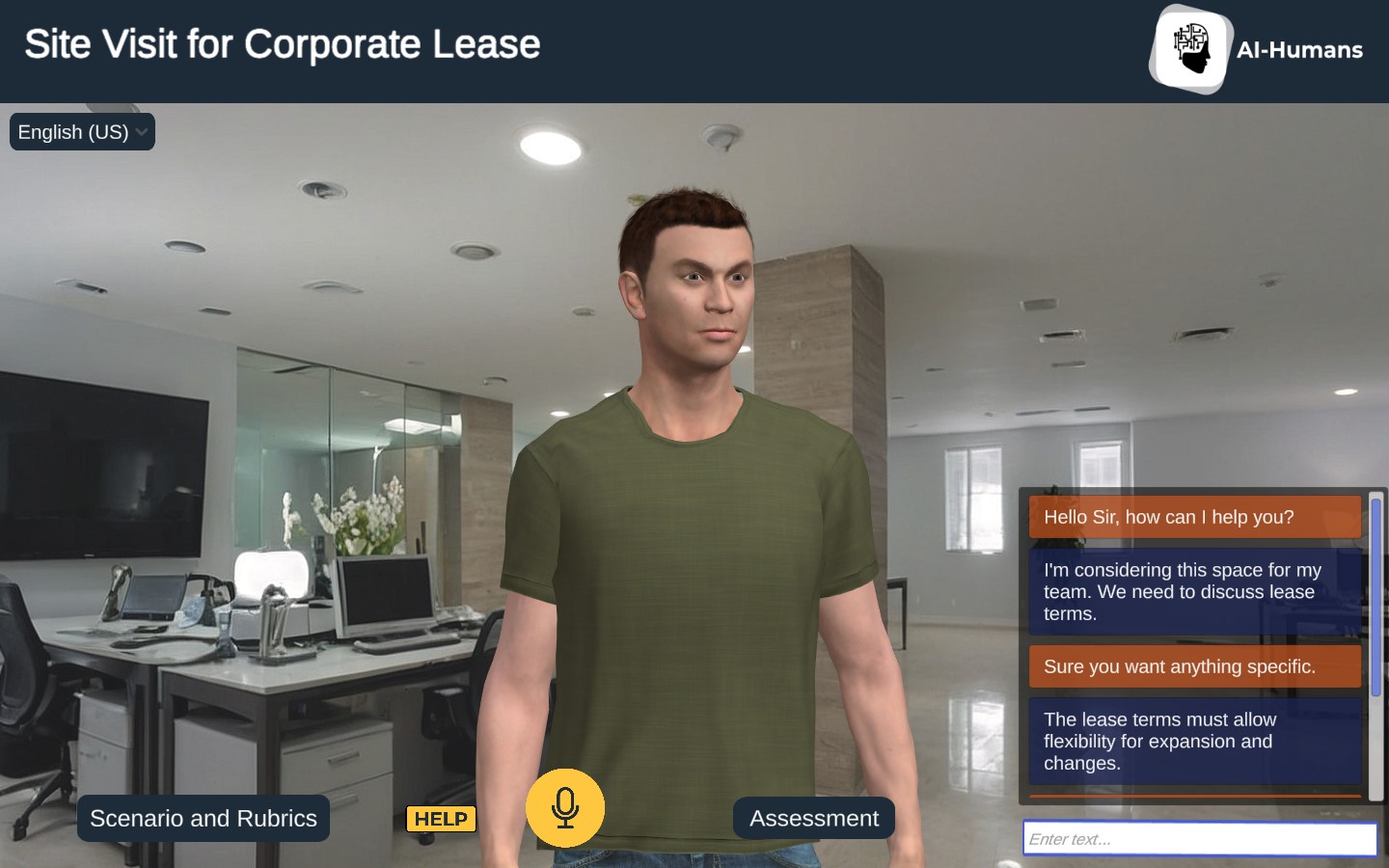In the competitive world of real estate, soft skills often serve as the backbone of success. Real estate professionals are expected to be master communicators, negotiators, and relationship builders. Their ability to understand client needs, handle objections, and create trust directly influences sales outcomes and long-term client relationships. In this context, traditional training methods like role-playing and seminars, while valuable, are not always enough to prepare agents for the diverse challenges they face daily. Enter AI-powered soft skills training.
Through AI-powered avatars and interactive simulations, SaaS-based platforms like AI-Humans offer an innovative, practical, and engaging way to hone these critical skills. By simulating real-life scenarios, real estate professionals can practice their responses, refine their approaches, and gain confidence without the pressure of real-world consequences.
Let’s delve deeper into how this technology revolutionizes training for real estate professionals and the tangible benefits it offers.
Crucial role of soft skills in real estate
In real estate, the product—whether a home, commercial property, or rental—is only part of the equation. People buy into agents before they buy into properties. Building rapport, understanding unspoken concerns, addressing objections tactfully, and creating a sense of trust and security are essential for sealing deals.
Soft skills in real estate include:
- Active Listening: Understanding what a client is truly looking for.
- Emotional Intelligence: Sensing and responding to the emotions of clients.
- Effective Communication: Explaining complex processes clearly and persuasively.
- Conflict Resolution: Navigating disagreements or hesitations diplomatically.
- Negotiation: Striking a balance between meeting client expectations and achieving sales goals.
These skills are not innate for everyone, and even experienced agents can benefit from ongoing refinement. Traditional methods like shadowing, seminars, or even trial and error in the field often fall short of providing comprehensive practice opportunities.
How AI-Humans makes a difference
AI-powered avatars bridge this gap by offering immersive, scenario-based training. Here’s how:
Realistic Simulations: AI avatars in platforms like AI-Humans can mimic human-like interactions with remarkable accuracy. Real estate professionals can practice handling scenarios such as:
- A potential homebuyer.
- A client concerned about market fluctuations.
- A heated negotiation with a property investor.
- Delivering unfavorable news tactfully, such as a rejected offer.
These simulations replicate real-world conditions, complete with realistic verbal and non-verbal cues, enabling agents to practice in a controlled, yet lifelike environment.
Personalized Feedback: AI systems analyze the user’s performance during interactions. For example, they might evaluate:
- Tone and Clarity: Did the agent sound confident and clear?
- Empathy: Was the agent responsive to client emotions?
- Persuasiveness: Did the agent effectively address objections?
Detailed, actionable feedback helps users identify strengths and areas for improvement.
Flexibility and Convenience: Unlike traditional workshops, AI-Humans’ web-based platform is available 24/7. Real estate professionals can access training sessions at their convenience, making it easier to integrate learning into their busy schedules.
Data-Driven Insights: AI systems provide measurable insights, allowing both individual professionals and their organizations to track progress over time.
Scenario Customization: The training scenarios can be tailored to address specific challenges faced by real estate agents in different markets. For example, an agent in a high-demand metropolitan area might practice navigating bidding wars, while a rural agent might focus on long-term relationship-building.

Benefits of AI-driven training for real estate professionals
Where every interaction can make or break a deal, AI-driven training emerges as a powerful tool for professional development. Here are some of the key advantages that make AI-powered training a game-changer for real estate professionals.
Enhanced Client Relationships: By refining their ability to listen actively and respond empathetically, agents build deeper trust with clients. This is particularly important in high-stakes transactions like home purchases, where emotions often run high.
Increased Confidence: The opportunity to practice challenging scenarios in a no-pressure environment helps agents build confidence. They can experiment with different approaches and refine their strategies before applying them in real client interactions.
Improved Negotiation Skills: Negotiation is a cornerstone of real estate. AI avatars simulate high-stress negotiation scenarios, allowing agents to practice maintaining composure and finding creative solutions.
Faster Onboarding for New Agents: For new agents, the steep learning curve can be daunting. AI-powered training accelerates onboarding by allowing rookies to practice conversations and processes repeatedly, shortening the time it takes to become client-ready.
Consistency Across Teams: Brokerages and agencies often struggle with ensuring consistent client service standards across their teams. AI-based training ensures that all agents receive the same high-quality preparation.
Cost Efficiency: While traditional training methods like seminars or in-person coaching can be expensive and logistically complex, AI-powered platforms provide a cost-effective alternative with scalable training solutions.
Use cases in real estate training
AI-powered training programs are highly versatile, offering tailored solutions for the unique challenges faced by real estate professionals. From handling tough client questions to mastering virtual communication, these simulations provide practical experience in various real-world scenarios. Below are some specific ways this technology is transforming how agents prepare for the demands of their profession.
Handling Tough Questions: Agents can practice responding to challenging questions like:
- “Why is this property overpriced?”
- “Can you guarantee the value will appreciate?”
- “Why should I choose your agency over others?”
Crisis Management: Unexpected situations, like a deal falling through, require agents to stay calm and composed. AI avatars simulate these high-pressure scenarios, helping agents prepare for worst-case scenarios.
Cross-Cultural Communication: With the growing diversity of buyers and sellers, real estate agents often interact with clients from different cultural backgrounds. AI simulations help agents practice culturally sensitive communication styles.
Why real estate agencies should invest in AI-powered training
The real estate sector thrives on human connections and trust. Investing in AI-driven soft skills training is not just a smart move—it’s a necessity in today’s competitive market.
Here’s why agencies should prioritize this technology:
Stay Ahead of the Curve: Adopting cutting-edge technology signals to clients and agents that the agency is forward-thinking.
Boost Team Morale: Providing agents with advanced tools for skill development shows that their growth is a priority.
Drive Sales Performance: Well-trained agents close deals faster and build lasting client relationships, driving revenue growth.
Adapt to Changing Consumer Expectations: Modern buyers expect personalized, empathetic service, and trained agents are better equipped to deliver.
The world of real estate is ever-evolving, and so are the demands on its professionals. AI-powered training platforms like AI-Humans provide a revolutionary way to develop the soft skills that underpin success in this field. By immersing agents in realistic scenarios, offering personalized feedback, and enabling flexible learning, this technology bridges the gap between theoretical knowledge and practical expertise.
For real estate professionals, the benefits are clear: better client relationships, enhanced confidence, and improved sales performance. For agencies, it’s an investment in the quality and consistency of their services.
In a profession where the right words and demeanor can make all the difference, AI-powered soft skills training is not just a tool—it’s a game-changer. Real estate professionals who embrace this innovation will not only thrive in today’s competitive market but also shape the future of the industry.

